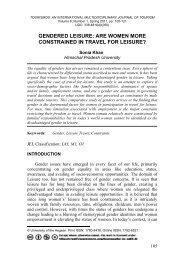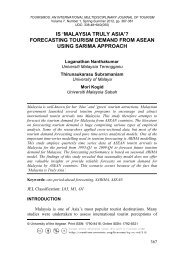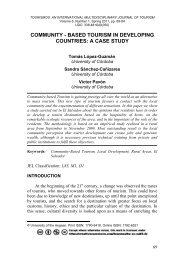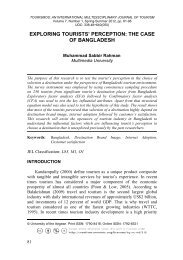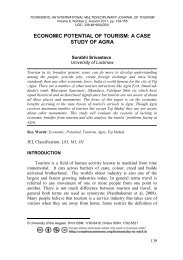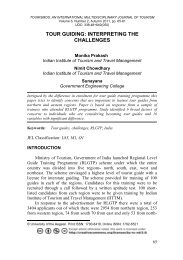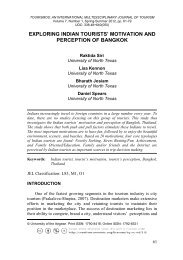TOURISMOS is an international, multi-disciplinary, refereed (peer ...
TOURISMOS is an international, multi-disciplinary, refereed (peer ...
TOURISMOS is an international, multi-disciplinary, refereed (peer ...
You also want an ePaper? Increase the reach of your titles
YUMPU automatically turns print PDFs into web optimized ePapers that Google loves.
<strong>TOURISMOS</strong>: AN INTERNATIONAL MULTIDISCIPLINARY JOURNAL OF TOURISM<br />
Volume 6, Number 1, Spring 2011, pp. 84-104<br />
UDC: 338.48+640(050)<br />
There are a large number of theories created with th<strong>is</strong> aim in the<br />
philosophy of morals. The most import<strong>an</strong>t ones are the teleological <strong>an</strong>d<br />
deontological theories among them (Fr<strong>an</strong>kena, 1973; Robin, 1980;<br />
Beauchamp <strong>an</strong>d Bowie, 1983; Harr<strong>is</strong> <strong>an</strong>d Sutton, 1995; De George, 1999;<br />
Karakaş, 2002). Another accepted theory in the philosophy of morals <strong>is</strong><br />
relativity theory (H<strong>an</strong>sen, 1992; Akoğl<strong>an</strong> Kozak <strong>an</strong>d Güçlü, 2006). The<br />
expl<strong>an</strong>ations of these theories are given below.<br />
Teleological Theories<br />
According to the teleological theory, <strong>an</strong> action <strong>is</strong> not right or wrong<br />
by itself. It <strong>is</strong> the results of the action that makes it right or wrong (Arsl<strong>an</strong>,<br />
2001, p. 16). In other words, the tendency to decide whether a behaviour<br />
on <strong>an</strong> action’s results <strong>is</strong> right or wrong reflects the teleological theory<br />
(Harr<strong>is</strong> ve Sutton, 1995, p. 805). Teleolog<strong>is</strong>m reflects the philosophy of<br />
morals based on measuring the moral value of a behaviour by me<strong>an</strong>s of<br />
the results of that behaviour (Ferrell <strong>an</strong>d Gresham, 1985, p. 89). The<br />
concept of teleology reflects the direction to <strong>an</strong> aim. Teleological ethical<br />
theories basically assert that the desired results will ar<strong>is</strong>e if the behaviours<br />
are morally right <strong>an</strong>d good. Teleological theories are divided into two<br />
groups as ego<strong>is</strong>m <strong>an</strong>d pragmat<strong>is</strong>m (Fraedrich, 1993, p. 208). Pragmat<strong>is</strong>m<br />
<strong>an</strong>d ego<strong>is</strong>m focus on the results of the behaviours instead of the rightness<br />
<strong>an</strong>d goodness of the activity. For that reason, these theories are also<br />
named as consequential<strong>is</strong>t theories. (Harr<strong>is</strong> <strong>an</strong>d Sutton, 1995, p. 805;<br />
Akoğl<strong>an</strong> Kozak <strong>an</strong>d Güçlü, 2006, p. 27).<br />
Deontological Theories<br />
Instead of only justifying the independence of the concept of right<br />
<strong>an</strong>d the results of the activity, it argues that the character<strong>is</strong>tics of the<br />
agents rather th<strong>an</strong> the import<strong>an</strong>ce of intentions (motivations) <strong>an</strong>d the<br />
actual results created by the agent should be considered (Beuchamp <strong>an</strong>d<br />
Bowie, 1983). Th<strong>is</strong> kind of philosophy focuses on the universal situation<br />
of right <strong>an</strong>d wrong; however, when exceptions occur, the philosophers<br />
asserts universals at first gl<strong>an</strong>ce taking these exceptions into consideration<br />
in certain circumst<strong>an</strong>ces (Robin oth., 1989). The main principle of th<strong>is</strong><br />
philosophy <strong>is</strong> to put forth the behaviour that every individual would<br />
exhibit in the same activity when s/he experiences the same case (H<strong>an</strong>sen,<br />
1992, p. 524). Deontological theories basically put emphas<strong>is</strong> on social<br />
rights rather th<strong>an</strong> the methods <strong>an</strong>d the motivations in a specific behaviour.<br />
The natural rightness of the behaviours lays the bas<strong>is</strong> of deontological<br />
87



